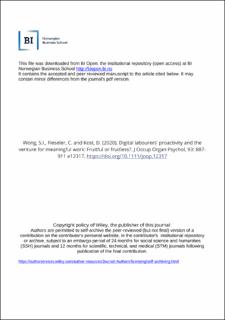| dc.contributor.author | Wong, Sut I | |
| dc.contributor.author | Fieseler, Christian | |
| dc.contributor.author | Kost, Dominique | |
| dc.date.accessioned | 2022-04-04T13:00:03Z | |
| dc.date.available | 2022-04-04T13:00:03Z | |
| dc.date.created | 2020-06-10T18:29:17Z | |
| dc.date.issued | 2020 | |
| dc.identifier.citation | Journal of Occupational and Organizational Psychology. 2020, J Occup Organ Psychol, 93: 887-911 e12317 | en_US |
| dc.identifier.issn | 0963-1798 | |
| dc.identifier.uri | https://hdl.handle.net/11250/2989673 | |
| dc.description.abstract | Digital Labor, taking up flexible but small-scale employment arrangements on onlineintermediary platforms, with few constraints on how much, when, and where work isperformed, are becoming the new work reality for many individuals. Scholars have arguedthat this type of work is inherently demeaning. We seek to explore the worker’sperspective and how theirlong-term perspective aligns or misaligns with their actual workarrangement. We draw on career construction theory and hypothesize a job–careercongruence model suggesting that when workers’ cognitive presentations of theirmicrowork as jobs or careers are incongruent, they are less likely to experience theirwork as meaningful. The results from a two-stage field study of 803 workers from twomicroworking platforms support the negative effect of an incongruent job–career schemaon workers’ experience of meaningful work. Additionally, results demonstrate that evenworkers who are proactive in nature, seem unable to excel in these fluid work settingswhen their job-career schema are not aligned. | en_US |
| dc.language.iso | eng | en_US |
| dc.publisher | Wiley | en_US |
| dc.title | Digital labourers’ proactivity and the venture for meaningful work: Fruitful or fruitless? | en_US |
| dc.type | Journal article | en_US |
| dc.type | Peer reviewed | en_US |
| dc.description.version | acceptedVersion | en_US |
| dc.rights.holder | Wiley | en_US |
| dc.source.pagenumber | 887-91 | en_US |
| dc.source.volume | 93 | en_US |
| dc.source.journal | Journal of Occupational and Organizational Psychology | en_US |
| dc.identifier.doi | 10.1111/joop.12317 | |
| dc.identifier.cristin | 1814893 | |
| dc.relation.project | Norges forskningsråd: 247725 | en_US |
| dc.relation.project | Norges forskningsråd: 275347 | en_US |
| dc.source.articlenumber | e12317 | en_US |
| cristin.ispublished | true | |
| cristin.fulltext | postprint | |
| cristin.qualitycode | 1 | |
